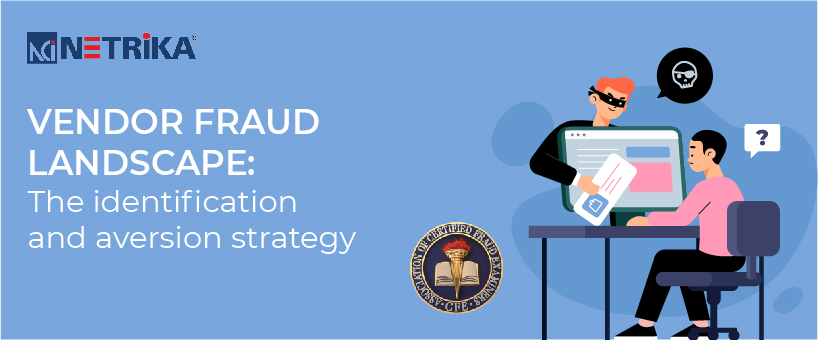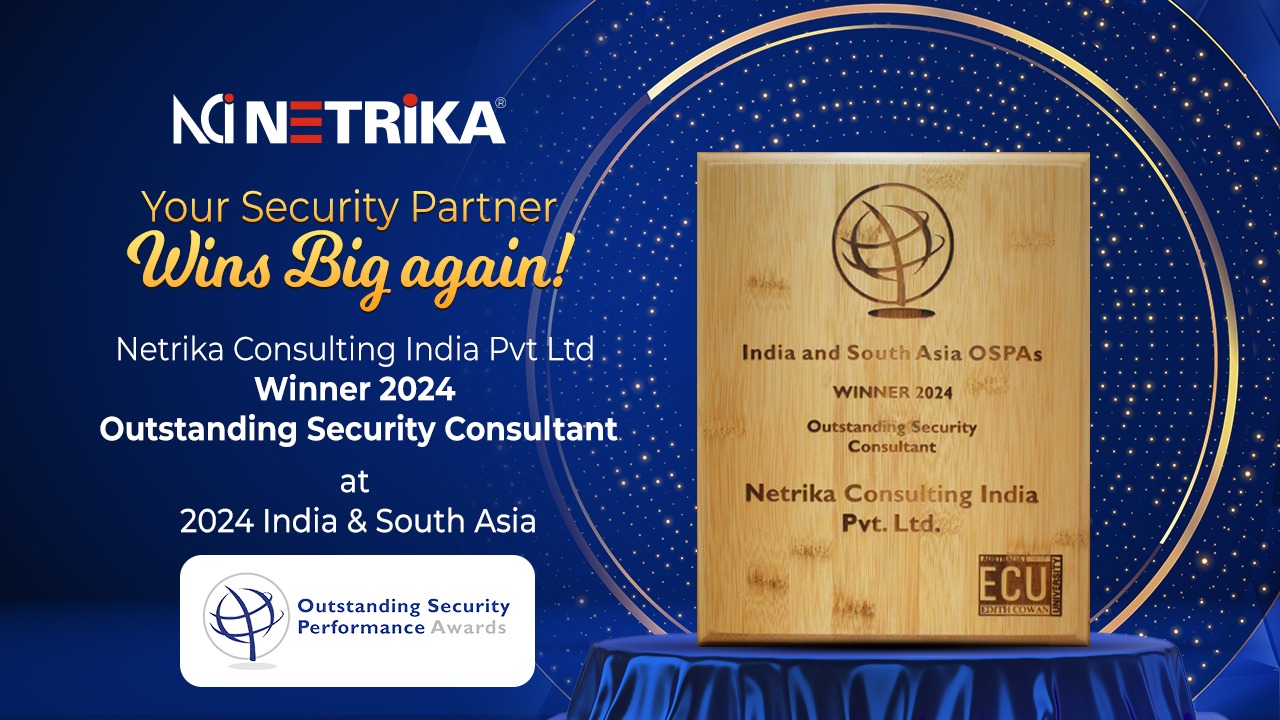Detecting and preventing vendor fraud through a strategic structure
- April 28, 2022
- Posted by: marketing@netrika.com
- Category: Blogs

The why and how of vendor fraud!
While internal threat encompasses a major section of the fraud landscape, employees are not always the fraud contributors in an organization. Businesses that provide their services or products to organizations can also engage in fraudulent activities, often termed vendor frauds.
Vendor or procurement frauds are the quid pro quo of businesses, where the procurement employee provides a vendor contract to a company or another individual in exchange for some benefits. Such frauds can be performed in a multitude of ways, especially in a scenario when the procurement employee and the vendor work in conjunction for a task.
In organizations with a supply chain, the procurement department forms the basis of bringing raw materials or goods to meet the business-customer requirements. Vendor requirements cater for the tailor-made end-user need. However, the person in charge of performing the task might engage in misappropriation of duties to bring a vendor onboard. When the procurement employee personally benefits from the business task transaction, they would choose to tailor the activity needs to meet theirs.
The employee might also choose to leak the confidential data of vendor selection to their preferred vendor. It is also highly possible that the organization does not engage in open bids, which makes the vendor selection process opaque. Furthermore, the procurement employee might choose to reject the winning bidder over minor issues and pass the bid to their choice of vendor to continue gaining benefits.
Why does a procurement employee incline over a specific vendor?
Procurement employees masquerade as the unbiased judges of selecting the best-suited vendor for the activity. Inclining to the vendor selection based on personal preference rather than expertise could become a deterrent to the organization’s growth. While the underlying reason for selecting a vendor is usually related to money, there are other contributing factors as well, such as:
1. A personal connection with the vendor
In most situations, vendor inclination could be a personal connection. This could be a family member, a friend or a relative. By awarding a personal connection with the vendor contract, a procurement employee is making a deal to gain benefits in return and enjoy the perks of financial rewards of the vendor contract mutually.
2. Silent partner of the vendor
Sometimes, a procurement employee would award the vendor contract to another business or individual in which they secretly have some hold or position. Thus the employee will gain financial benefits from the contract and will also expand the business for capital and reputation gain.
3. At the receiving end of kickbacks and bribes
When a procurement employee awards a vendor contract to another company or individual, they might expect perks, gifts, monetary or intangible gain in return. These gains could be money, occasional presents, family holiday or premium membership to luxury clubs.
How to detect and evert procurement fraud?
The procurement departments have employees ranging from a handful to a fleet where both could be at a high risk of being accomplices in fraud. With little oversight of these departments and the employees, there are higher chances that the organization would become a victim of vendor fraud without even suspecting it.
However, there is a streamlined strategy developed by certified fraud examiners to both detect and avert such frauds and offer a secure ecosystem for organizations to operate.
Set up a hotline
While the procurement employee is on the trail of allowing vendor fraud, masked under a trustworthy employee, there might be others who would get an air of truth behind the contract. These people might wish to be honest with the organization, just not out in open. For that purpose, you can have a hotline set up in the organization to allow whistleblowers inside to report suspicious behaviour and activities. These scrupulous employees can become the true strength of your business, enabling a safe and secure vendor contract process.
However, while setting up a hotline, it is vital to ensure it follows a simple procedure that employees can easily access and comply with company policies. Moreover, for both single multiple recordings, the communication line should be secure, safeguarding the employee’s anonymity.
Require anti-fraud training
If your employees do not know what encompasses the fraud landscape and what does vendor fraud look like, then it is likely your employees would fail in recognizing its presence. Therefore, regular training, through a certified fraud examiner will assist the organization’s employees with detecting and averting vendor fraud.
It will also enable them to comply with the law regulations and company policies. The training also paves a path for employees to identify and highlight red flags that would possibly result in vendor contract fraud.
Choose vendors carefully
The most vital and demanding action to prevent vendor fraud is to choose your vendors wisely and vigilantly. Therefore, it is essential to conduct a thorough assessment of the vendor or vendors shortlisted for the contract.
What your employee vouches for a vendor might not always be true and there might be some hidden agenda behind the preference. Furthermore, assessing vendors on the criteria based on their financial stability, information security, testimonials and past or current business collaborations, credit score, public records etc.
Audit vendor lists frequently
Auditing is a well-established and highly functional tool to identify vulnerability or potential fraud in the procurement department. The auditing team or team led by the certified fraud examiner can organize frequent audits every couple of months, or surprise audits throughout the year to ensure the secure operations of the department. Auditing your procurement department often can also help prevent fraud. Schedule audits every six months, and throw in a few surprise audits throughout the year, too.
Rotate and supervise procurement staff
Procurement employees usually have multiple vendors to handle with too many responsibilities. When you adopt this strategy of relying too much on one employee for data, you make your organization vulnerable to fraud. A single employee should not be engaged in a closed-loop activity, like choosing bids for vendor contracts, interactions with vendors and negotiating the contract terms
Vendor fraud is a delineation of your organizational incapability in identifying breeding risks around you that circumvent to cause capital and reputational loss. The intensity of vendor fraud can in fact be associated with time spent reviewing vendor contracts, their background check, updating and revision policies, procedures and training processes that play a key role in its escalation.
While the task is difficult and requires professional experts, not every business incorporates such experts to streamline the vendor contract process policy structure and strategies. This is where Netrika comes to your rescue with its certified fraud examiner course.
Netrika collaborates with ACFE India to offer fraud examiner certification courses to aspiring professionals across industry verticals. We are the expert global leader in offering specialized training regimes with comprehensive industry exposure.
Our CFE certificate course allows the participant to gain professional visibility and credibility while enhancing their marketability and job security across the globe. With an instructor-led CFE training course, Netrika empowers and generates awareness for both a professional and the organization to impede potential frauds and limit the risk of the one that has already impacted the entity.
The certified fraud examiner course helps professionals gain insight into the vendor fraud identification and prevention foundation. It helps to access the current vendor contract strength, audit clause language, and select good candidates for vendor audits.
The programme can be attended by internal and external auditors, forensic accountants, controllers, CPAs, accounting professionals, government auditors and investigators, and procurement officers.

